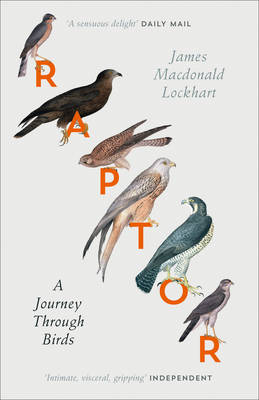 As a birder and particularly a lover of all things raptor, a book with the title ‘Raptor’ would always catch my fancy. The cover promises that it is ‘a journey through birds’, and displays some beautiful imagery of some of the birds of prey that the United Kingdom has to offer. I was hooked on the spot and decided to buy this book.
As a birder and particularly a lover of all things raptor, a book with the title ‘Raptor’ would always catch my fancy. The cover promises that it is ‘a journey through birds’, and displays some beautiful imagery of some of the birds of prey that the United Kingdom has to offer. I was hooked on the spot and decided to buy this book.
Reading the book does not disappoint. It sounds like quite a daunting task: describing all fifteen nesting raptors in the UK. The book is set up brilliantly for it. James Macdonald Lockhart starts his journey all the way up in Orkney, and travels through the UK searching for each individual raptor species. Each chapter is dedicated to one particular species, and Macdonald Lockhart does a lot more than just tell us about the bird. He tells us about the landscape and the relationship the raptor has to that landscape. He tells us about the history of the relationship between raptors and humans, and how this has developed in recent years. This can sometimes be a bit depressing, as humans and their actions have brought so many of Britain’s raptor species to the brink of extinction. There is room for optimism, too: humans are also involved in the return of species like the red kite, the buzzard and the osprey, with many initiatives to protect them throughout the UK.
While reading each chapter, you feel like you’re right there birding with him, and you feel like you’ve become part of the bird’s life. The amount of knowledge in this book is astounding, and I have already been able to use some of the acquired knowledge during my own birdwatching.
This book is also a love letter to the late Scottish naturalist and ornithologist William MacGillivray, who in 1819 set out for a walk from Aberdeen to London to visit the British Museum at the age of 23. On this journey he kept a diary, and there are many fragments from this diary included in ‘Raptor’. MacGillivray was a fantastic observer of all things wildlife and plants, and his notes really add an extra layer to the book. Sadly, MacGillivray never really got the recognition Macdonald Lockhart successfully claims he deserves, and as a reader you do wonder why you have never seen his name before, especially as a birder. ‘Raptor’ also features some of the watercolours MacGillivray made during his life, which are now apparently hidden in storage at the Natural History Museum and are never seen by anyone. I for one would love to see his watercolours, and am determined to get myself a copy of his most famous work ‘A History of British Birds’. MacGillivray intended for the watercolours to be included in this book, but didn’t have the money to make this happen. However, his descriptions of these birds are so vivid that you don’t actually need to see it at all. This is a rare gift, and I can only hope that other readers of ‘Raptor’ will join me in trying to get more attention to his work.
Even for people who are not generally fond of raptors there is a lot to enjoy in this book. It’s beautiful prose, and any book that is written by someone with a clear passion about the topic will draw you in regardless of whether you are actually as passionate about the topic yourself. Warmly recommended.
Title: Raptor
Author: James Macdonald Lockhart
ISBN: 9780007459896
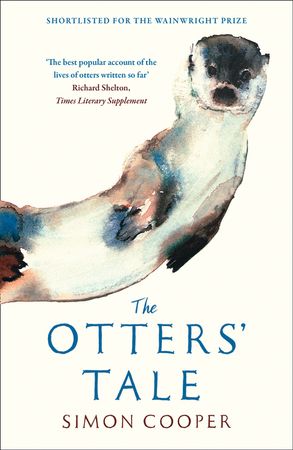 As the saying goes, you shouldn’t judge a book by its cover. Yet, it was the cover of The Otters’ Tale by Simon Cooper that drew me towards it, featuring a beautiful watercolour painting of a curious otter by Mark Adlington. As someone who loves nature writing and has a lifelong wish of seeing an otter, I knew this was one of those books I had to read. I felt that it might shed some light on the life of an animal I knew very little about, except for the fact that I wanted to see one more than anything.
As the saying goes, you shouldn’t judge a book by its cover. Yet, it was the cover of The Otters’ Tale by Simon Cooper that drew me towards it, featuring a beautiful watercolour painting of a curious otter by Mark Adlington. As someone who loves nature writing and has a lifelong wish of seeing an otter, I knew this was one of those books I had to read. I felt that it might shed some light on the life of an animal I knew very little about, except for the fact that I wanted to see one more than anything.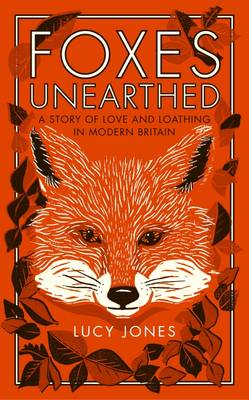 Why is Britain so different in this aspect? Although Jones does not answer all the questions that I have, as she focuses purely on Britain and not on other country’s attitudes towards foxes, she sets out on a bold description of all the reasons why British people either love or hate foxes, and either love the hunt or hate the hunt. She talks to all the parties involved. Scientists who have studied the behaviour of foxes, farmers who fear for their lifestock, hunters who genuinely think that what they’re doing is the right thing, hunt saboteurs who are convinced that foxes are still being killed every weekend across the country, they all get their say on the matter. It is truly marvellous to read, and although I am strongly opposed to fox hunting as it used to be in Britain and the book did not change my mind, it made me more aware of other people’s opinions and more importantly why they would have these opinions. Foxes unearthed really is the kind of book that makes you think for a moment, and really enlightens you on different viewpoint on the same topic.
Why is Britain so different in this aspect? Although Jones does not answer all the questions that I have, as she focuses purely on Britain and not on other country’s attitudes towards foxes, she sets out on a bold description of all the reasons why British people either love or hate foxes, and either love the hunt or hate the hunt. She talks to all the parties involved. Scientists who have studied the behaviour of foxes, farmers who fear for their lifestock, hunters who genuinely think that what they’re doing is the right thing, hunt saboteurs who are convinced that foxes are still being killed every weekend across the country, they all get their say on the matter. It is truly marvellous to read, and although I am strongly opposed to fox hunting as it used to be in Britain and the book did not change my mind, it made me more aware of other people’s opinions and more importantly why they would have these opinions. Foxes unearthed really is the kind of book that makes you think for a moment, and really enlightens you on different viewpoint on the same topic.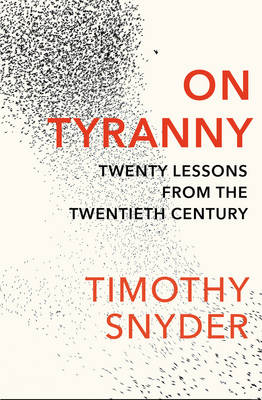 His expertise does not disappoint. Each lesson, ranging from speaking out on topics and causes you care about to not looking the other way when things become strange and potentially dangerous, is timely and important. You could say that some lessons seem obvious, but are they really? The entire world keeps repeating that we should never make the same mistakes from the twentieth century again, yet here we are in a situation that is frighteningly similar to what happened in both the Third Reich and the Soviet Union. Leave it to Timothy Snyder to draw the comparisons that may seem obvious to some, but are ignored by too many.
His expertise does not disappoint. Each lesson, ranging from speaking out on topics and causes you care about to not looking the other way when things become strange and potentially dangerous, is timely and important. You could say that some lessons seem obvious, but are they really? The entire world keeps repeating that we should never make the same mistakes from the twentieth century again, yet here we are in a situation that is frighteningly similar to what happened in both the Third Reich and the Soviet Union. Leave it to Timothy Snyder to draw the comparisons that may seem obvious to some, but are ignored by too many.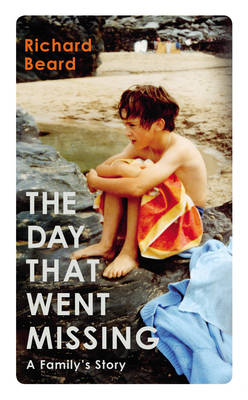 drowned as well but managed to escape the sudden incoming tide. Only now, nearly 40 years later, does Richard start to wonder what actually happened that day and immediately after.
drowned as well but managed to escape the sudden incoming tide. Only now, nearly 40 years later, does Richard start to wonder what actually happened that day and immediately after.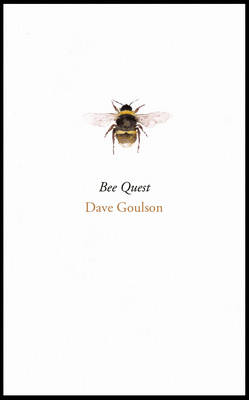 Every now and again Dave Goulson switches to bee-nerd mode, and immediately apologises to the reader for doing so (which he shouldn’t do, because I loved these elaborate descriptions of a type of bumblebee I had never in my life heard of, and was only distinguishable from another for a little bit of different colouring, for example). This book is, more than anything, a passionate cry about how things should be done differently with regards to wildlife conservation. Farming destroys the plants and flowers that bumblebees so desperately need, and abandoned industrial sites turn into wildlife havens, only to be considered for another supermarket or a parking lot.
Every now and again Dave Goulson switches to bee-nerd mode, and immediately apologises to the reader for doing so (which he shouldn’t do, because I loved these elaborate descriptions of a type of bumblebee I had never in my life heard of, and was only distinguishable from another for a little bit of different colouring, for example). This book is, more than anything, a passionate cry about how things should be done differently with regards to wildlife conservation. Farming destroys the plants and flowers that bumblebees so desperately need, and abandoned industrial sites turn into wildlife havens, only to be considered for another supermarket or a parking lot.